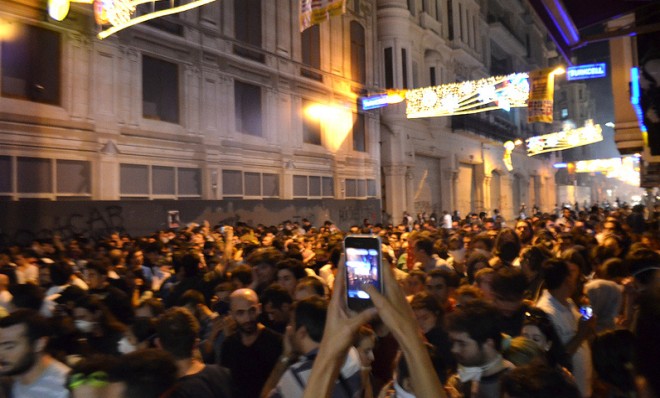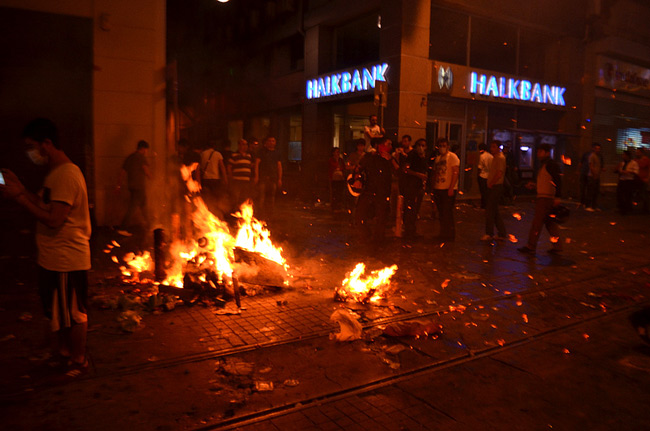Dispatch from Istanbul: Anti-government protests explode in Turkey [Updated]
What started as a peaceful demonstration to save sycamore trees has quickly escalated. And the police are cracking down violently

A free daily email with the biggest news stories of the day – and the best features from TheWeek.com
You are now subscribed
Your newsletter sign-up was successful
ISTANBUL, TURKEY — I came to Istanbul to enjoy a breezy six days researching local street food and checking in on the contemporary art scene. But within a couple of hours of arriving from the airport on Thursday afternoon, I was standing among thousands of chanting protesters in Taksim Gezi Park, the city's version of Manhattan's Zuccotti Park.
I was there because my friend Peri Mekmak wanted to show me the trees that were slated to be cut down so that the city could redevelop the park into a mall. Today, Gezi Park is filled with sycamores. The park is a few blocks long on either side, and is the only real swatch of vegetation in this congested downtown area. The city's plan is to build a compound-looking structure walled in by store fronts instead.
The crowd at the protest on Thursday filled the park with that purposeful and focused form of activism generally found at college campuses and for most of the duration of Occupy Wall Street's efforts in New York City. Homemade signs, catchy songs, and a stage for speakers were all in place. The crowd represented a diverse swath of Istanbul — young and old, rich and poor. When we left the park, Peri and I felt buoyed by the energy and excitement, even if she believed nothing would change for the fate of the park. "I am so proud of my people," she kept saying.
The Week
Escape your echo chamber. Get the facts behind the news, plus analysis from multiple perspectives.

Sign up for The Week's Free Newsletters
From our morning news briefing to a weekly Good News Newsletter, get the best of The Week delivered directly to your inbox.
From our morning news briefing to a weekly Good News Newsletter, get the best of The Week delivered directly to your inbox.
Then, everything changed. What I saw on Friday and Saturday is extremely different from that feel-good protest. Tear gas is now being used casually just to manage people. The usual bustling revelry of Istiklal Boulevard has been replaced by the ebb and flow of crowds marching towards Gezi Park and then racing back as the riot police push forward. People are making homemade gas mask from simple construction respirators, a suggestion put out on Facebook, which everyone is checking obsessively for updates.

This ancient city is a warren of side streets that can make you feel trapped, especially when it's your second day in town. And now, the smoky tear gas crawls down the side of the buildings and hits you even when you can't see it. People choke up and run. I was amazed at how fast the burning hit my face from a safe distance from the gas. I found safety in a bar. The staff at the door let people in and quickly shut the entrance as the crowd flooded by on the street. The bartenders were accommodating and tried to keep a sense of normalcy as people pushed in scared, many crying. The DJ spun, people drank beers, and as the only exit was shut, smokers lit up if they had them.
"The park was a pretext for a protest against the government," said my new Kurdish friend now sharing a beer with me.
He mentioned the protest songs that were both from the liberal side as well as the Kurdish Party. Everybody I spoke to said that this march was a long time coming. They complained about Prime Minister Erdogan's power grab and crackdown on individual rights.
A free daily email with the biggest news stories of the day – and the best features from TheWeek.com
When I saw people strolling and not running outside the bar I knew it was time to head back to my flat. I walked down Istiklal. The protest had turned much darker, and I'm sure that will help authorities counter-spin the event. The mostly male crowd was targeting storefronts and smashing them, many pulling off material from buildings to build a chain of bonfire along the avenue. The shouts were now more angry rather than just resistant.
I was able to make my way through the crowd and smoke to my flat. I could hear chanting and fog horns in the distance. This is normally a beautiful neighborhood of coffee shops, galleries, and ancient buildings that looks over the Bosphorus. It's hard to remember that today.
The people of Istanbul love their city deeply. In spite of the ferocity of the protests, I still see tremendous solidarity here. A local court has put an injunction on further development of the park until both sides submit their cases.
But on the street, things are really escalating, and in a very worrying way.
UPDATE (Saturday, 4 p.m. local time): I'm in Beyoglu, a bohemian neighborhood of cafe-lined streets and beautiful architecture on the European side of Istanbul. Normally it has the bon vivant air of Paris' Left Bank. Today it has the feel of the French Revolution.
The gorgeous panorama from my flat window includes the Blue Mosque and the Marmara Sea, and is now paired with the churning chants of thousands of marchers just out of view, helicopters above, and acrid clouds of tear gas floating by.
Just blocks away from me is Istiklal Boulevard, the battleground between protesters and the police. Authorities have set up blockades of armored vehicles, water cannons, and tear gas. The police push their way down this commercial main street as protesters funnel in out of side streets to re-engage the police back on Istiklal.
Earlier this afternoon, I saw citizens throwing rocks, police standing with shields, and tears running down bystanders' faces.
Amid the tumult, one thing is very clear: How completely unified the public is about the protest.
The refrain from everybody I meet is: "Tell our story to the world. Our press will not."
Shop keepers are giving out water, coffee, and the now ubiquitous lemon slices to help counteract the tear gas. Pots and pans are clanged in solidarity from apartment windows.
The neighborhood is under siege, but it has a celebratory feel. My French landlady has become an unofficial ambassador to those who need comfort from around the city. She and a boarder from Buenos Aires are making big pots of rice to feed to activists who need nourishment. Wine is freely poured.
The police who are not on the front lines seem to be taking a very practical position on the protest. They are permitting people to move about without harassment, and are answering questions from pedestrians.
But people are still worried. Bervan Karaldi, a resident near Galasaray, told me this: "It will get worse before it gets better. I hope something good [comes] from this."
The protest will return tonight to where the movement ignited and the place it seeks to preserve, Gezi Park.
Ben Pomeroy is a freelance writer whose work has appeared in Bon Appetit and HowAboutWe.com. Formerly, he co-founded and produced a web-based radio show about environmental and sustainability issues called Now or Never. Read his blog here.
-
 Democrats push for ICE accountability
Democrats push for ICE accountabilityFeature U.S. citizens shot and violently detained by immigration agents testify at Capitol Hill hearing
-
 The price of sporting glory
The price of sporting gloryFeature The Milan-Cortina Winter Olympics kicked off this week. Will Italy regret playing host?
-
 Fulton County: A dress rehearsal for election theft?
Fulton County: A dress rehearsal for election theft?Feature Director of National Intelligence Tulsi Gabbard is Trump's de facto ‘voter fraud’ czar
-
 The billionaires’ wealth tax: a catastrophe for California?
The billionaires’ wealth tax: a catastrophe for California?Talking Point Peter Thiel and Larry Page preparing to change state residency
-
 Bari Weiss’ ‘60 Minutes’ scandal is about more than one report
Bari Weiss’ ‘60 Minutes’ scandal is about more than one reportIN THE SPOTLIGHT By blocking an approved segment on a controversial prison holding US deportees in El Salvador, the editor-in-chief of CBS News has become the main story
-
 Has Zohran Mamdani shown the Democrats how to win again?
Has Zohran Mamdani shown the Democrats how to win again?Today’s Big Question New York City mayoral election touted as victory for left-wing populists but moderate centrist wins elsewhere present more complex path for Democratic Party
-
 Millions turn out for anti-Trump ‘No Kings’ rallies
Millions turn out for anti-Trump ‘No Kings’ ralliesSpeed Read An estimated 7 million people participated, 2 million more than at the first ‘No Kings’ protest in June
-
 Ghislaine Maxwell: angling for a Trump pardon
Ghislaine Maxwell: angling for a Trump pardonTalking Point Convicted sex trafficker's testimony could shed new light on president's links to Jeffrey Epstein
-
 The last words and final moments of 40 presidents
The last words and final moments of 40 presidentsThe Explainer Some are eloquent quotes worthy of the holders of the highest office in the nation, and others... aren't
-
 The JFK files: the truth at last?
The JFK files: the truth at last?In The Spotlight More than 64,000 previously classified documents relating the 1963 assassination of John F. Kennedy have been released by the Trump administration
-
 'Seriously, not literally': how should the world take Donald Trump?
'Seriously, not literally': how should the world take Donald Trump?Today's big question White House rhetoric and reality look likely to become increasingly blurred